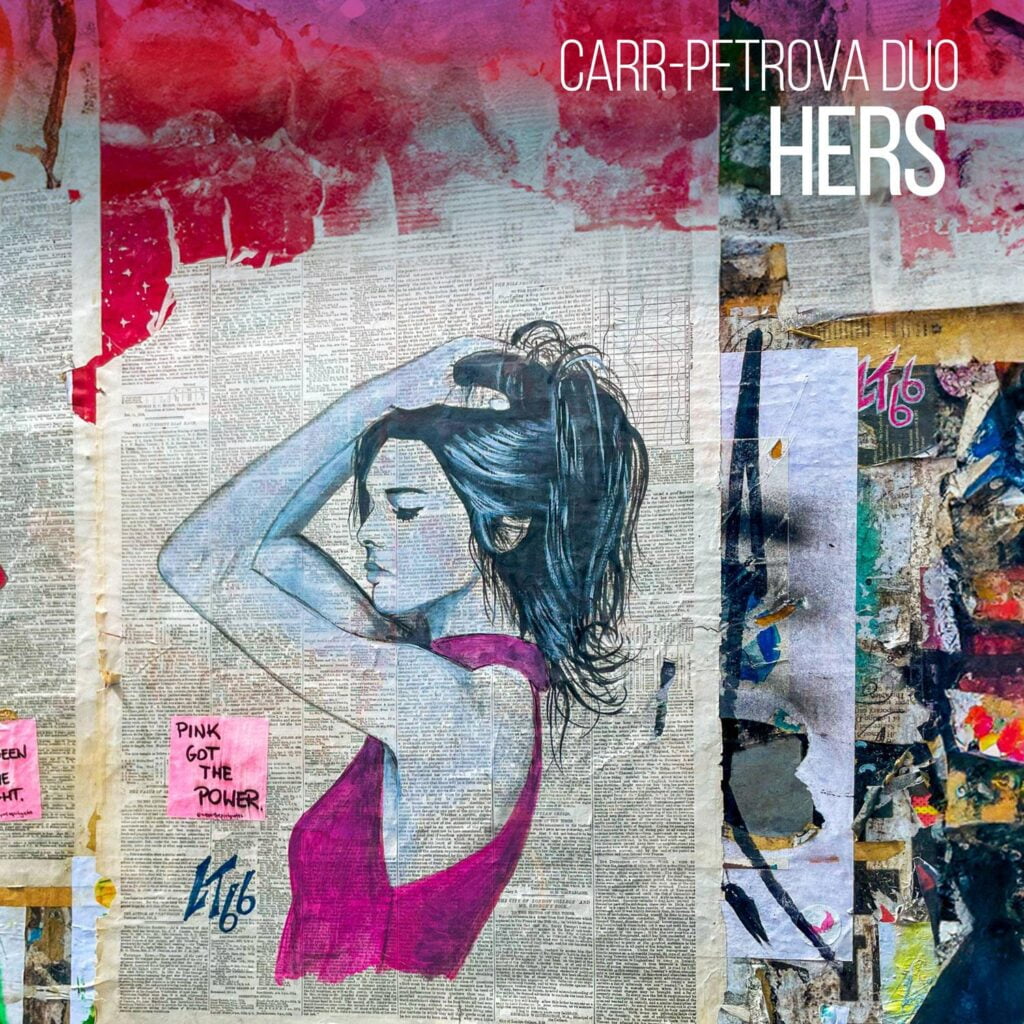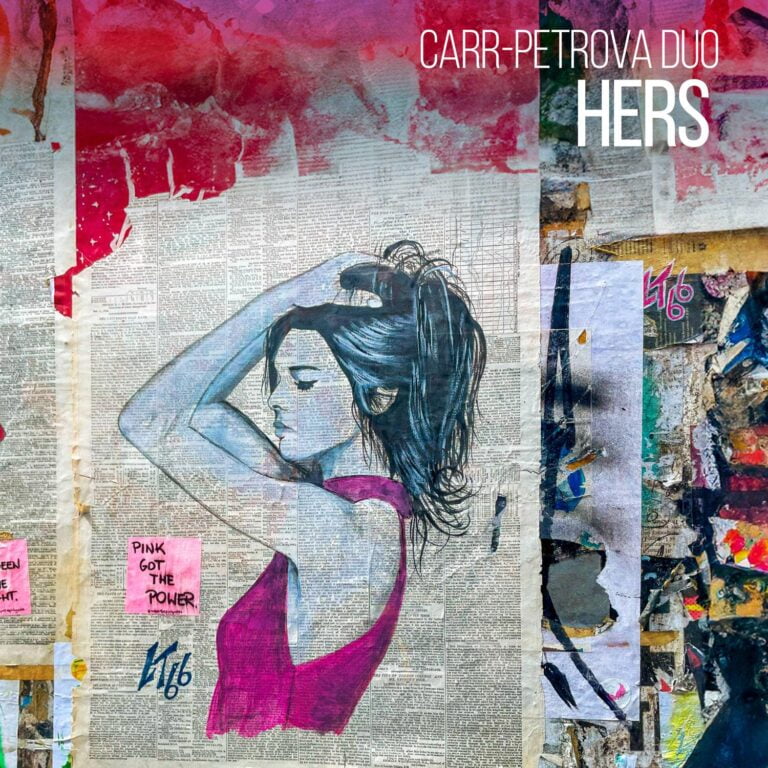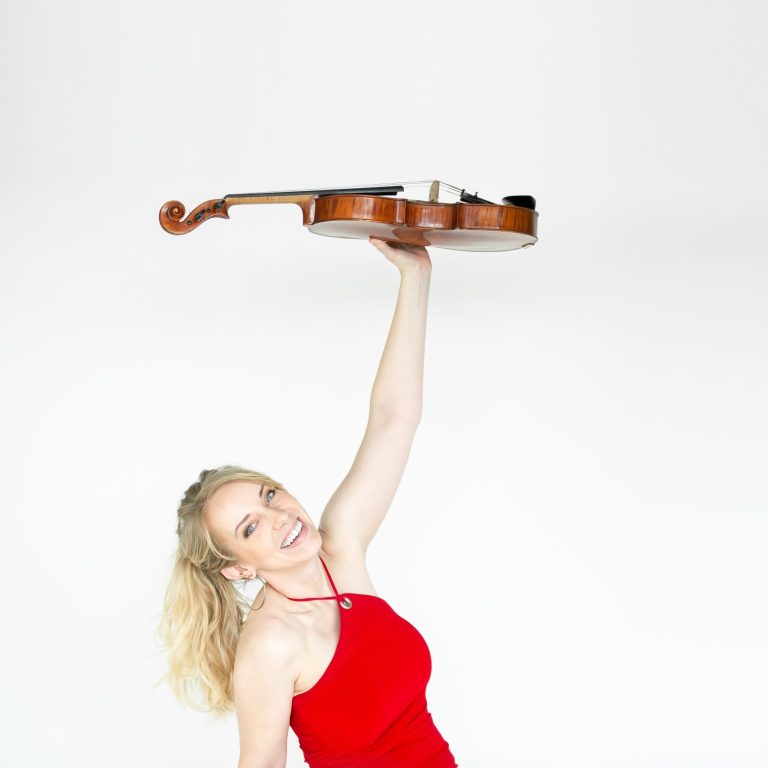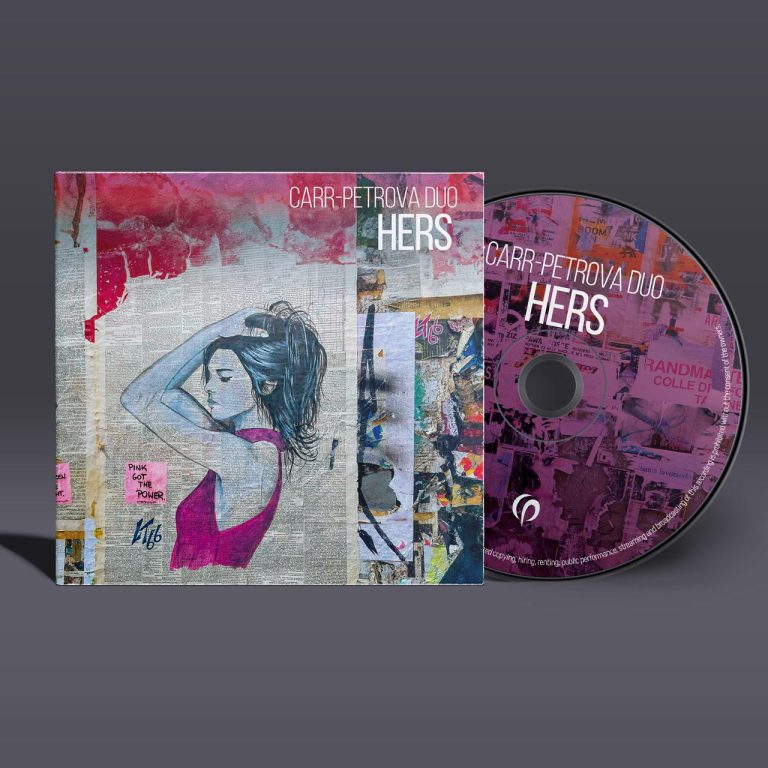With this album, we aim to highlight and celebrate the vision, strength, resilience, and vital contributions of the many women musicians who have come before us and who continue to lead our field forward today. Their lives and musical paths are all so different but each one inspires us to follow our dreams as 21st-century musicians.
The idea of HERS was born during the height of the COVID Pandemic. When lockdowns began, Molly (with her husband and their pooch) decided to escape New York City and drive to Louisville, Kentucky to live with Anna. We were amongst the few lucky musicians able to spend the lockdown together. We had no concerts, no clarity on our future, and no place to be… Everything in the foreseeable future was canceled. But we had unlimited time, our imaginations, a viola, and Anna’s baby grand piano. The unstructured time during the pandemic gave us the space to dream big and create music and projects without a specific “career” purpose. We found ourselves playing and enjoying music for music’s sake – amidst, of course, an appropriate amount of pandemic Netflix binge nights and sampling of Trader Joe’s ice cream flavors. In this creative space, our musical appetites were unleashed, and we started to hunger for not just what was “standard” or “accepted” as part of the classical repertoire, but what excited us – regardless of genre or style. We wanted to transcribe and commission music that felt right for us and lit us up, with no other purpose in sight: whether it would be played on a concert stage, or in Anna’s living room, it didn’t matter…
After a few months of this carefree brainstorming, and countless hours of musical exploration and discovery, we realized that most of the music we had selected to play was in fact written by… women! And not just any women – women with fascinating and powerful stories. It seemed like a natural step to combine it all into a single program and subsequently an album. And thus, HERS, was born.
Rebecca Clarke bears a special significance in our story: she holds the title of one of the first professional female violists in history. During her lifetime, she premiered numerous new works for the viola and helped the instrument become recognized as a worthy and equally expressive sister to the violin. Her Sonata for Viola and Piano was actually the first piece we ever played together, and we included it on our debut album Novel Voices. Again, it is thanks in part to Rebecca that we, Molly and Anna, can follow our dreams, concertize worldwide, and exist in the music industry as a Viola-Piano Duo – and so we knew that our album of female composers would not be complete without one of her works. For this album we chose Morpheus.
Rebecca initially faced doubts about using her real name to publish and premiere her compositions due to mixed reactions to her music. However, after adopting the pseudonym “Anthony Trent,” her compositions (interestingly…) seemed to garner greater acclaim; listing “Mr. Trent” as the composer of Morpheus led to enthusiastic reviews of its premiere, rightfully acknowledging its brilliance.
Named after the Greek god Morpheus, the god of sleep and dreams, the piece keeps you in a dreamy flow state from its first note to its last. Rebecca weaves a beautiful tapestry of her characteristically impressionistic colors, which like dreams, sway in and out of warmer, more passionate or emotionally invested moments – to us, signifying the varying dream states of traveling through the subconscious. During our living room jam sessions, we often read this piece at night, when the light was dim and our imaginations were starting to drift into dream-land.

Around the same time, the duo decided to dole out homework assignments to each other: we each had to find composers and music we were interested in performing. When we returned to Anna’s living room for the big reveal, we were surprised to discover that we had both gravitated toward the music and inspiring life of Hildegard von Bingen. Hildegard was an ordained nun, canonized saint by the Catholic Church, a polymath, a composer, a writer, a mystic, a philosopher, a poet, and a musician, all of which were incredibly hard to be as a woman in her time. She was a true Renaissance Woman in the Middle Ages. Her chants were hypnotizing for us, and we were certain we wanted to play her music but knew that it would need a modern vessel to successfully live in the viola/piano duo repertoire. We turned to the brilliant Vivian Fung to ask if she might write something for us based on Hildegard’s work. Vivian graciously agreed but also let us know that she had in fact already composed a piece based on Hildegard – her Prayer for orchestra, commissioned by the NAC in Ottawa. The work had been premiered through a socially-distanced recording of each orchestra member, pasted into a massive video collage. When Vivian offered to transcribe the piece for viola and piano, we readily accepted!
Knowing that the piece originally lived in Vivian’s imagination as an orchestral piece has presented a fun added challenge for us: we’ve enjoyed mimicking the full orchestra sonorities, timings, and timbres as we have brought this to life for the first time as a viola/piano version. Both in its new form as well as its original orchestral version, the piece is beautifully moving and highly personal.

Clara Schumann has been an inspiration to musicians throughout the centuries, and remains a model for our own careers as women in the 21st century. As a soon-to-be first-time mom, Molly in particular now is drawing inspiration from this super-woman who concertized all across Europe as one of the leading virtuosos of her time (in the age of the horse and buggy), premiered many of Brahms’ and Robert Schumann’s works, while acting as one of their chief compositional consultants. She did this while raising eight children, caring for her ailing husband and their household, and composing in her free time!
We absolutely love Clara’s Three Romances. Each Romance flows from both instruments with the most natural, almost inevitable, silken phrasing. We find ourselves weaving, exploring, singing, crying, rejoicing together through each Romance. During our initial album brainstorming, we were thrilled to discover that these pieces had already been transcribed for viola and piano by Kalinowsky, and have been enjoying performing them as often as we can!

Our album of female composers would not have been complete without the special voice of Molly’s childhood best friend, Michelle Ross. During the pandemic so many seismic shifts occurred globally – some were negative, but some were surprisingly positive. One such positive shift was Michelle’s focus in her musical life from that of a performing violinist exclusively to that of a composer. Since that moment, Michelle has had her compositions premiered at such renowned festivals as Tanglewood and Lucerne, and has been commissioned and recorded by some of the most beloved artists and ensembles of our time. We are proud to say that this shift for Michelle happened with… Where Things Weigh Nothing At All, which she wrote for us in Fall of 2020.
In her own words:
“This piece begins and ends in a dream state. The viola and piano weave in and out of awareness of each other, and along with the listener, are traveling between the interior or exterior worlds. This is represented in improvisational gestures, expressive rubato and conversational elements between the two voices. After the introduction, there is a moment which signifies our emergence from memory and from this anchor, the music spins out into extremely luscious, harmonically bright and rich conversational themes between the duo. Momentum builds towards two peaks, from which we finally recede back towards the anchor of “time,” which instead of feeling concrete, has transformed into a memory.
The title “Where Things Weigh Nothing At All” is a line from my favorite Milan Kundera novel – The Book of Laughter and Forgetting. This is simply one of many allusions that weave in and out of the subconscious of this piece, such as a fragment of a Gregorian chant that hung above my piano where I composed the work.
Implicit meaning guided my compositional process: instead of attempting to transcribe the Gregorian Chant, I allowed it to swirl along with my other ideas and imprint itself into this piece however it unfolded. The beginning of the score indicates to the performers: “walking together, unknowingly,” as if they are singing the same fragments of this chant across different realms, different times – perhaps in a similar way that a composer attempts to sing a melody they aren’t sure they know where it comes from…
After the final double bar, another quote from The Book of Laughter and Forgetting emerges:
The young man looks into her eyes, he listens to her and then tells her what she calls remembering is really something entirely different: Under a spell, she watches her forgetting.
Tamina nods in agreement.
Into space? But what is it that renders her look so heavy?
It is not heavy with memories, the young man explains, but heavy with remorse. Tamina will never forgive herself for forgetting.
“So what should I do?” asks Tamina.
“Forget your forgetting,” says the young man.
Tamina smiles bitterly: “Tell me how you manage that.”
“Haven’t you ever felt like going away?”
“Yes,” admits Tamina. “I want terribly to go away. But where?”
“Some place where things are as light as the breeze. Where things have lost their weight. Where there’s no remorse.”
“Yes,” says Tamina dreamily. “Where things weigh nothing at all.”
And as in a tale, as in a dream (of course it’s a tale! of course it’s a dream!), Tamina comes out from behind the bar where she has spent several years of her life and leaves the cafe with the young man. A red sports car is parked at the curb. The young man sits down at the wheel and invites Tamina to get in beside him.

When Anna first discovered Amy Beach’s Romance for Violin and Piano, she immediately called Molly and told her, “We have to play this piece, even if you have to learn to play the violin!” Thankfully, a fellow violist named Molly Wise had already gifted the viola world with an eloquent transcription, so Molly Carr did not have to learn to play the violin in the end. The lyrical lines of the Romance which start quietly and ever so tenderly, later soar and roar into the most passionate culmination – which make our hearts pump in our chests each time we play the work. It is works like this one that make us grateful upon each and every performance that we chose to be musicians.

A flexible powerhouse singer, songwriter, producer, and dancer, Beyoncé is a multifaceted global superstar by any measure. She has over 71 million listeners monthly and has won more awards than any other artist in music history. Amongst those accolades she also wins “One of the Carr-Petrova Duo’s Favorite Artists.” During the summer of 2020, we hopped in our cars and embarked on a two-month long road trip across the country. We visited most of the major national parks, hiked, camped, and had a fabulous time communing with the bears and staying far away from humans. During our trip, it became a daily tradition to roll down the windows and sing at the top of our lungs to all of our favorite pop, Disney, hip-hop, opera, you-name-it-we-sang-it songs. It was then that we asked ourselves… “If we are having the time of our lives every time we croon with our highly untrained voices to Beyoncé, what would happen if we could sing with our highly trained musical instruments? Why don’t we play these tunes in our concerts?” Right then and there, with the squirrels and coyotes as our witnesses, we swore we would find a way to bring those tunes onto classical concert stages. We knew that there would be no better person to take on this task than Henrique Eisenmann, our longtime friend and fellow faculty member in Juilliard. He is the only male exception that we allowed into the composer list of HERS, but his piece is still very pertinent to this story as it is inspired by none other than the Queen B herself, Beyoncé. With his jazz and Brazilian background, Henrique weaved Beyonce’s Halo into an original, fantasy-like piece, which has held its own on classical music stages as well as anywhere else it has been played so far. The pop icon’s song is but one of the many exciting elements in the music, flowing through Brazilian rhythms, rock and roll, hoppin’ jazz vibes, and much more.
—
Andrea Casarrubios’ Magnitude speaks of the power of the individual to effect change in our world. We have lovingly begun to nickname this piece “our anthem for the ordinary people,” because it tells the story of a few women fearlessly following their dreams and subsequently creating ripples of change of remarkable magnitude.
Let us explain:
In 2018, the duo undertook an epic project in which we traveled around the world to visit and perform in refugee camps for a year. We were stirred to start this monumental project in an effort to learn and better understand the refugee crisis. Every time we turned on the news, every time we opened social media, every time we read the paper, every time we had a conversation with peers, mentors, colleagues, and friends – the theme was the same: “What can we do? The situation is heartbreakingly hopeless.”
And so, as two ordinary people, we grabbed our instruments, a composer and two filmmakers and took off for the camps. Our goals were two-fold: 1) we wanted to meet those behind the word “refugee” – to see the faces, hear the stories, understand first-hand for ourselves the situation, and bring back what we learned into our everyday lives as artists in America. 2) We wanted to gather information on ways ordinary people can get involved and help make small changes. To learn more about this project visit the Novel Voices page on our website which includes an interactive map of the US with links to refugee organizations in each state.
During our travels into the camps, we visited the Deheisheh Palestinian Refugee Camp in the West Bank. While there, we had the opportunity to hear a concert of a group called “The Daughters of Jerusalem” – an ensemble of Palestinian women who study at the Edward Said National Conservatory. After the spectacular performance, we met with the director of the group who described for us how these young girls are completely changing the music scene in the Middle East by simply pursuing their dreams of being professional musicians. They are creating a musical genre that the director told us “has never existed before them… to have a group of women singing together, to have a group of women playing instruments together on stage has never happened in the tradition of Palestinian music before. In fact, a mere ten years ago, it was unheard of to witness a Palestinian girl walking down the street with an instrument on her back. Today, because of these girls – it is common practice.” These girls and their journey inspire us beyond measure, and we are honored to be able to tell their story.
In the foreword of Magnitude, Andrea writes, “I couldn’t help but consider the magnitude—the tremendous impact [The Daughters of Jerusalem] will continue to make, and how their courage in music can have such important repercussions in generations to come.” And on the cover of the score, she has a single drop of water falling into a pool with the resulting ripples filling the page – a visual representation of the impact even the actions of an “ordinary person” can have in changing our world.

In closing, the stories of all these brave mothers, sisters, and daughters on this album and our own stories are inextricably intertwined. We, in fact, owe our lives in music to the women of HERS and play each piece with gratitude for their fight to overcome, express, and create in a system and a world that often wished to silence them. With this album, we pay homage to these women, whose actions have created a butterfly effect of epic magnitude; it is because of their choices through the centuries that we can follow our dreams today as two female artists and continue to pave the way for those who come after us.
– Molly & Anna




